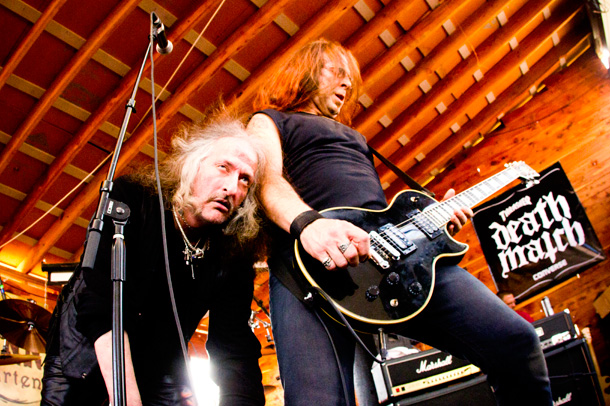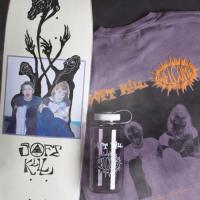Pentagram

"After Johnny Thunders died, I was the poster boy for narcotics for 20 years."
Photo: David Broach | Interview: Jordan Joseffer
Bobby Liebling and Victor Griffin of Pentagram graced us with a few minutes to talk about the band. They’ve flipped their lives from drug abuse to sobriety and God—but though they’ve changed a lot, they’re still Pentagram and they still rule.
How’s all the black leather treating you in this Austin heat?Bobby: Drippy! Dye coming out all over my arms, looks like I haven’t showered in six weeks—what you expect when you’re wearing all leather in 95 degrees.
Who were the bands you played with when you guys first started?
Bobby: We didn’t really play with anybody, before we started playing with Death Row. You can’t play in the Washington, DC area if you don’t play covers. There’s never been a more dead music scene than in DC.
Victor: People weren’t very serious about anything other than learning Judas Priest songs. You’ve got to pursue your dream, and you’re not going to do that by playing other people’s music.
You seem to have good chemistry on stage.
Bobby: He gives me a yin-yang. He’s like flesh and blood to me. When I’m playing with him I’ve got the confidence to be goofy or mean or whatever I want to be. He’s an incredible guitar player; he’s an innovator for sure. I have the utmost respect for him. I wouldn’t want to play with anybody else, to be quite honest.
Victor: It’s true! I feel the same way about Bobby. We’ve had our rocky roads, but we’ve never fallen out with each other.
So you guys are clean and sober?
Victor: We tried all that stuff for a long time in the ’80s and half of the ’90s—as well the cult symbols that go along with it—and none of it ever got us anywhere. Now we’ve both cleaned our lives up and have gotten away from the dark images, upside down crosses and pentagrams, all the satanic symbols and negative crap. Now look what’s happening. Very few bands in history start to escalate their career after this many years. It’s just unheard of. Someone’s got a bigger plan.
Bobby: I found sobriety a few years after Victor did, and he saw that I was serious about my commitment. My spirituality, my direction, no more of that downstairs dwelling.
Victor: We talked on the phone one day, and I said, “Look, I’m not trying to lay down a rule book or anything. You just got to maintain your scurrility and drop all the satanic symbolism.” And it worked.
What does rock bottom mean to you? How far did you go?
Victor: I hit rock bottom around ’97. It’s getting to a place where you can no longer do it for yourself. You’re down so low that you finally reach a place where you can start to crawl your way back up.
Bobby: All the drugs got me sick, disjointed, my body was ripped to shreds, and my faith in rock’n’roll had died. After Johnny Thunders died, I was the poster boy for narcotics for 20 years. I’m in my late 50s. When I met my wife my life changed very, very drastically. She’s definitely my soul mate. She said, “I see through the scars, the abscesses, the holes, the tracks, and I see a softness under there.” She stuck with me and we’ve been together four years now. She gave me a baby, he’s six-months-old, and I’m loving life.
-
4/20/2024
Skegss Interview
Australia's Skegss are the reverb drenched summer soundtrack you need. Read the exclusive Thrasher interview. -
4/20/2024
Beirut Interview
The music of Beirut has been featured in many skate vids over the years, most notably in Mark Suciu’s “Verso” masterpiece. Mark caught up with Zach Condon, the man behind the band, in this exclusive interview. -
4/20/2024
Tom DeLonge Interview
Angels & Airwaves was born out of Tom DeLonge leaving Blink-182. Here he talks about charting that band’s own path along with his thoughts on skating and UFOs. -
4/20/2024
Greta Van Fleet Interview
Using musical chemistry, the band members of Greta Van Fleet extract the essence of various classic rock anthems. They combine the parts they like and create a sound all their own. These guys truly rock and roll. -
4/20/2024
Mononeon Interview
The term "musical prodigy" doesn't quite capture the bass-playing abilities of Mononeon. It's more accurate to say he's one of the best to ever pick up the instrument. See for yourself. -
4/20/2024
Animal Collective Interview
Animal Collective blew up in the skate world when their song was used in Jake Johnson's Mind Field part—which is regarded as a masterpiece of skating/editing/music. The band's unique legacy and sound has only gotten stronger in the following years. -
4/20/2024
Thurston Moore's Interview
Thurston is a founding member of Sonic Youth and a guitar virtuoso. His various projects have created a rich musical legacy. He also has deep roots with skating and video-making. Here he describes the mutual affection between skating and his music. -
4/20/2024
Soft Kill x Welcome Skateboards
Welcome gets the singer from Soft Kill on the line to discuss music, addiction and their recent collaboration. -
4/20/2024
R.A. the Rugged Man Interview
During his 30-year career, R.A. has occupied both the spotlight and the status of an underground hip-hop legend. His song "Uncommon Valor" is regarded as a lyrcial masterpiece and he shows no signs of stopping. -
4/20/2024
Third Eye Blind Interview
After millions of album sales since the mid-90s, Third Eye Blind frontman Stephan Jenkins continues to make music without compromise or concern about radio hits and pop charts. He features Cher Strauberry in his newest video and she sat with him for an interview.









